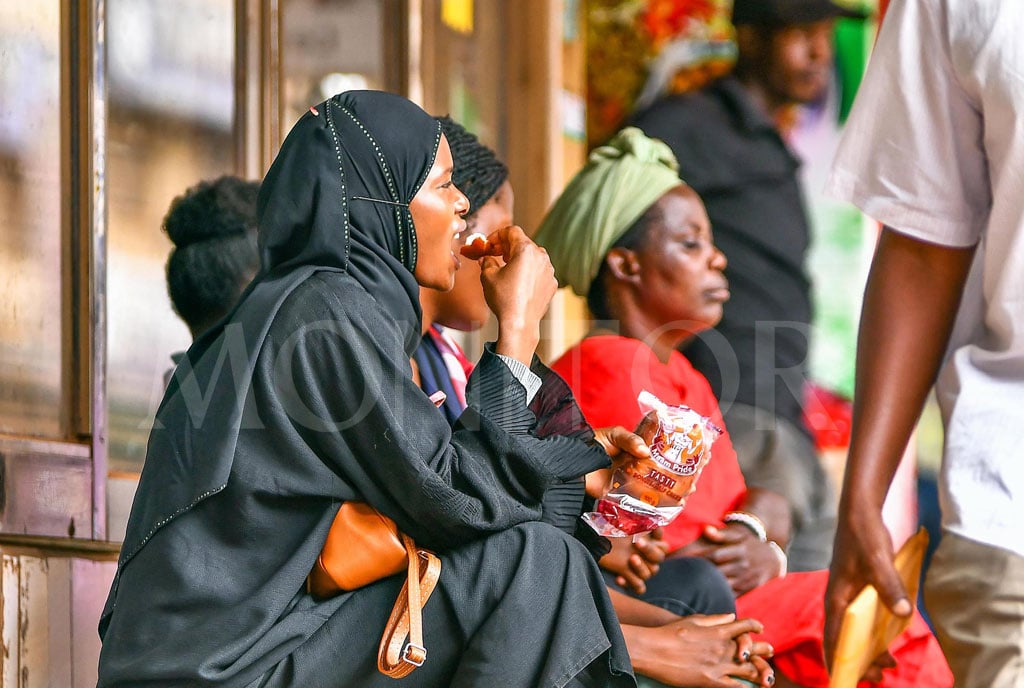Prime
Beading gives young mothers hope

Young mothers make handicrafts from beads and reeds to earn a living in Aswa, Gulu. PHOTOS/ ANDREW KAGGWA.
What you need to know:
- Empowerment. Making beaded products creates sustainable livelihood for young mothers in Aswa
On a Tuesday in Aswa, a town in Gulu District, it is a market day. Also, one of the days at the weekend is a market day thus, during the week the anticipation for potential clients is low.
Some people are trying to go to Gulu City to do some shopping, while others are running their grocery shops, and others are simply engaging in small talk.
Away from the town, though, there is a small building that seems to be a beehive of activity; here, girls have come together to learn how to make beads and other handicrafts.
But, these are not just ordinary girls; these are teenage mothers who are acquiring different skills to enable them to create a sustainable livelihood.
“Teenage pregnancies and motherhood are big problems on this side of the world; they were only worsened by the Covid-19 lockdowns,” says Winnie Okwir.
Okwir is one of the founders of Beads of Rapha, an initiative in Aswa Town that is intended to empower young mothers by skilling. The girls are taught how to make handicrafts such as baskets, hats, mats, and beads.
It is the beads that many of them end up making the most of because they have a vast market that is constantly available.
Beads of Rapha, the Child mothers’ Empowerment Association, was born out of a need at the heels of Covid-19-related lockdowns in 2020. Okwir and two other friends had noticed the increasing number of child mothers, most of whom could not fend for themselves, and had decided to intervene.
At first, they used their own savings to fend for the girls, but they noticed it was not sustainable. That is when they thought of creating something sustainable.
“Plus, the more girls we helped, the more others would come,” Okwirsays.
Okwir used to work for Civil Fund Uganda, where they supported young people through agriculture. When the project ended, Okwir and her team started devising means of starting something for girls.
Starting out
The team brainstormed and came up with the idea of establishing a vocational training centre specifically for young mothers. They believed that by equipping these girls with practical skills, they would not only be able to support themselves but also break the cycle of poverty. With this vision in mind, Okwir and her team began reaching out to potential partners and donors to secure funding for their project.
Alex Okot, another of the co-founders of the entity, is a survivor of the infamous Northern Uganda war. Okot lost part of his hand during one of the attacks when he was a child and says the effects of the war still contribute to the issues the region is facing.
“Insurgency was present in this area. It is the village of Alice Lakwena; the war started here; there were massive killings in the area,” he says, adding that issues from this war have affected the area; most of the girls are orphans.
“Most of the child mothers were of parents that were child mothers as well,” he says.
He says many of these girls either lost their mothers to the insurgency or are products of rape.

Young mothers display their handicrafts. PHOTO/ Andrew Kaggwa
Covid-19 effects
With all that background, the area’s situation was escalated by Covid-19 at the beginning of 2020. The Covid-19 pandemic exacerbated the already dire situation in the region, compounding the challenges faced by the community. The lack of resources and healthcare infrastructure further worsened the conditions for the vulnerable population, but that was just the beginning.
Without school, both boys and girls had more time on their hands, and that’s how girls became child mothers while most of the boys ran off.
Beads of Rapha at the moment has about 60 girls, and Okwir says they expect the numbers to increase.
“We are not sure what the leaders are doing. They say they are doing something, but the numbers keep increasing.”
To make matters worse, the HIV/Aids prevalence rates in the area are high, especially among women. Thus, Beads of Rapha was forced to make a decision, either help all child mothers or only those that were expectant and also infected.
“We would have wanted to help everyone, but we noticed that expectant mothers who are also infected are more vulnerable,” Okot says.
This commitment, however, comes with more challenges; most of the girls do not know their HIV status, so when they show up for the programme, they get tested, and some start medication for the first time.
Of course, there has been a lot of stigma towards infected mothers, but Okwir says it usually happens to the helpless ones.
“Because they sit at home and don’t do a lot. At the moment, when they are productive, there is no stigma,” Okwir says.
When Beads of Rapha signs up a girl, they train her in making beads, liquid soap and crafts for three months. After the training, they are given a start up fund to produce their first works.
“At that time, we do follow ups to see them start and stabilise, Okot says.
Since it is a programme that needs more hands, Okwir says that among the people they have trained, they intend to retain some of the good ones to turn the into trainers as well.
Aiding mothers
The main aim is to help child mothers sustain their own lives in respectable ways, unfortunately, Okwir and Okot agree that it is challenging. For instance most of the girls are not patient enough, they want to make very quick money.
“Most of them, after giving birth, resort to prostitution to make a living, in fact, some of them were not initially HIV positive by the time they were pregnant but got it on the job and got infected. Since they find prostitution lucrative, getting them to make beads or crafts is hard, they learn and somehow still go back to the streets,”Okwir says.
At the moment, she says that among the girls they are training, there are at least two active sex workers. They were more but most of them left the trade, one of the two active ones only resumed because she claimed she had a lot of bills to settle.
Layik still suffers the consequences of the war, years after guns in the region went silent. Okot says that even when the rebels were defeated, they never stopped feeling like there is terror around the corner.
“People are still disappearing, and unexplained arrests still go on,” he says, which has broken more families and left more children in charge of homes.
With more broken families and cutthroat poverty, many young people have dropped out of school to start a life.
The current lot of mothers training started in July, and many of them had never done beading before.
Most of them, after training, choose beading over crafts because they claim there is a ready market. One of the trainees, Patra Akidi, for instance, says people easily buy beaded bags at Shs60,000 and other accessories such as wrist bangles, necklaces, and shopping bags.
“You may not be that lucky with crafts such as hats and mats,” she says.
The highs
Akidi also says getting material for beads is easy as most of it comes from Arua City, and the products from beads can withstand different weather patterns and conditions.
Akidi learnt about the programme from her Local Council leader and has not looked back since. At one point, she tried crafts before settling for beading products. She says, as there are other opportunities for work in the area, this is profitable and less hectic.
“This is better than digging; you can make money digging, but you will be very tired. I can make five bags a week, and if sold, that’s a better deal,” she says.




